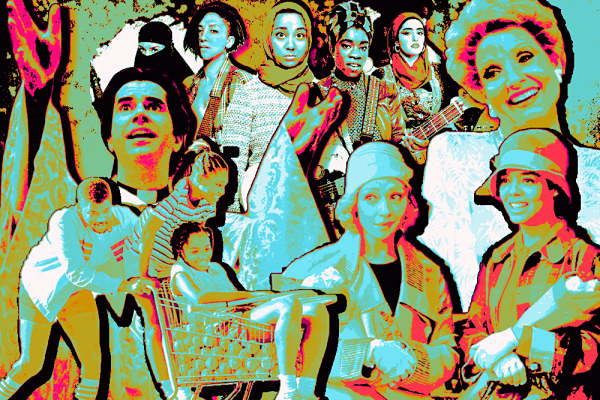In season two of Ted Lasso, our favorite stubbornly positive coach struggles with anxiety. Unfortunately, the king of talking-it-out doesn’t initially trust talk therapy. In an uncharacteristic display of disrespect, Ted — who doesn’t want to dig up his past traumas — calls the work of the team’s sports psychologist, Dr. Sharon Fieldstone, “bullshit.” Somehow, Fieldstone keeps her cool. “I can’t be your mentor without occasionally being your tormentor,” she tells Ted.
By the end of the season — surprise, surprise — Ted comes around. He’s learning from and leaning on Sharon. And so is the audience. This year, I’ve been grateful for the TV shows and movies that have mentored me and tormented me, the ones that didn’t shy away from tough issues like racism, sexism, and greed. The works below are honest and beautiful, start to finish.
1. Midnight Mass
In this Netflix miniseries, a charming priest brings miracles and danger to a dying, remote fishing village. There are supernatural evils wreaking havoc on the town, but, as film columnist Olcese explains in “‘Midnight Mass’ Shows the Horrors of Co-Opted Faith,” the real villain of the show is the “deluded righteousness” found in uncritical religious fervor.
2. Judas and the Black Messiah
In this moving film, Daniel Kaluuya brings to life Fred Hampton, the Chicago leader of the Black Panther Party who was crucified by the FBI for his activism. “Words are beautiful,” says Hampton in the movie “but action is supreme.” Judas and the Black Messiah powerfully portrays an explosive chapter in the ongoing struggle for racial justice in the United States.
3. Mass
In Mass, the parents of a boy who was killed in a school shooting and the parents of the boy who shot him meet in a church basement. According to contributor Juliet Vedral, watching the film is “gut-wrenching and humbling.” As flies on the walls of the church basement, viewers learn that “radical empathy makes radical forgiveness possible.”
4. The Eyes of Tammy Faye
Jessica Chastain has wanted to portray Tammy Faye for years. “[Tammy Faye] knew she was funny and ridiculous and was gonna embarrass herself, but she was in on the joke,” Chastain told Olcese in an interview. The Eyes of Tammy Faye doesn’t gloss over the corruption and prejudice embedded in the evangelical movement, but ultimately “the film stands on the side of empathy, encouraging the audience to embrace Tammy Faye — and each other — in love and understanding.”
5. King Richard
The film King Richard spotlights Richard Williams, the father of tennis legends Venus and Serena Willams. We watch as Richard “pushes his daughters to play better, to love each other, to respect adults, and to be themselves,” writes assistant news editor Mitchell Atencio in “The Unorthodox Love of Venus and Serena’s Father.” Given the ways sports culture has often pushed athletes to physical excellence at the expense of personal wellbeing, it’s refreshing to watch “Richard’s genuine commitment to his daughters as people first.”
6. Respect
Respect was bound to be an enjoyable film simply because we’d get to watch one of the best singers of one generation (Jennifer Hudson) portray one of the best singers from a generation past (Aretha Franklin). But as former associate editor Da’Shawn Mosley points out in “Aretha Franklin Biopic ‘Respect’ Highlights Dangers of Patriarchy,” the movie goes deeper than that. We watch as “Aretha’s voice is repeatedly curtailed, her desires opposed.” The queen of soul wasn’t always treated with the respect she deserved.
7. Petite Maman
Writer/director Céline Sciamma has always excelled at exploring the intimate and complex relationships between women (see: Portrait of a Lady on Fire); Petite Maman, a French film about a little girl helping her mother clear out her childhood home after the death of her grandma, is no exception. “Sciamma’s movie becomes a meditation on everyday sacred spaces, including those that can exist within mother-daughter relationships,” writes Olcese — an apt story during a pandemic that has forced us “to reconsider our definition of what makes a ‘sacred space.’”
8. Passing
Ruth Negga delivered my favorite performance of the year as the magnetic and troubled Clare, an African-American woman in 1920s New York City with skin that is light enough to pass for white, even convincing her racist white husband. The film shows how dangerous it can be to not live into your true self. “We’re, all of us, passing for something,” quips Rene (Tessa Thompson), who has skin as light as Clare, but chose a different path. But in this film, every path is fraught by some flavor of prejudice and fraudulence, be it sexuality, class, or race.
9. Ted Lasso
An American football coach is in over his head coaching professional European football league. Fortunately, the chaotically optimistic coach believes anything is possible. Season two focused on mental health, but it also supplied romance, humor, and hope in a year that kept serving up devastation.
10. We Are Lady Parts
The Peacock series We Are Lady Parts follows an all-female, Muslim punk band. We watch as the ensemble prays, jams out, and bumps up against cultural expectations of what it means to be a good Muslim woman. But “they aren’t rebelling against their faith,” writes reviewer Olcese, “their expression of it is just unorthodox.”
Got something to say about what you're reading? We value your feedback!






